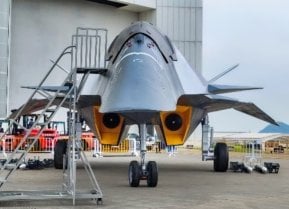Donald Trump Must Rebuild the Space Force He Created
To realize the service’s original vision, the returning Trump administration needs to reshape Space Force leadership. The most important step is to appoint exceptional civilian leadership that will demand greatness from the Space Force.
Americans have come to expect the country’s military services to operate at the bleeding edge of technology, armed with the most state-of-the-art equipment in the world. In the Air and Sea domains, U.S. warplanes and warships are the most advanced, by a large margin. Indeed, America’s military services lead technological development in all of their respective domains. All, that is, except one.
In space, the United States is lagging.
This represents an odd state of affairs because, unique among the services, the United States Space Force is not hampered by a limited industrial base. Rather, America's entrepreneurial space industry is enjoying an unparalleled dominance in size, innovation, and operations.
Most, but certainly not all, of America's space resurgence can be attributed to SpaceX and its leader, Elon Musk, whose most critical contribution has been his genius in harnessing the untapped potential of the American people's space expertise. Musk succeeded by allowing the U.S. to flourish in the space domain in ways that NASA, the Air Force, and "big aerospace" have failed to do for fully a half-century.
Indeed, American industry has left the rest of the world in the dust, both in terms of the number of annual space launches and in terms of vision and ambition. It has successfully flown the Starship, a vehicle that promises a radical transformation in space operations that rivals the steamship in terms of historical importance. American industry also deployed the next great global utility of worldwide satellite internet in the form of Starlink, the importance of which has been proven both on the battlefields of Ukraine and the flooded fields of North Carolina.
The U.S. government’s foray into space, however, has been more halting. In the years leading up to the creation of the Space Force, the country’s space general officers refused to fight for the creation of their service, preferring to remain silent or even actively opposing independence. And once that independence was assured, these same generals neglected to offer the people an optimistic vision of America's space future.
Space Force has followed this same sorry trajectory. Five years on from its establishment, all signs suggest the Space Force is following in the bureaucratically comfortable but plodding steps of past government space bureaucracy, instead of embracing the unbridled determination, optimism, and hunger for glory of the American space ethic.
Today's Space Force is, sadly, little more than the satellite maintenance corps of the U.S. military, and isn’t on the sort of path outlined by those who originally sold the idea to the President.
It is no surprise that many Americans don't know the Space Force even exists. Those who do question its usefulness.
It doesn’t have to be this way, however.
To realize the service’s original vision, the returning Trump administration needs to reshape Space Force leadership. The most important step is to appoint exceptional civilian leadership that will demand greatness from the Space Force. President Trump must appoint principals who understand the promise of the space domain, and the extraordinary potential of the American space industry, and will accept nothing less than greatness from Guardians of all ranks.
Thereafter, with the commanding heights of leadership secured, the Space Force must immediately and unequivocally embrace the commercial space industry and its role in it, to harness its potential. The new Administration needs to nudge the service to abandon its largely self-imposed mediocrity and embrace this destiny.
With these steps, which are far easier to take than most imagine, the Space Force will finally become worthy of the United States.
Brent Ziarnick is a visiting associate professor in the U.S. Space Force Professional Military Education program at Johns Hopkins University in Washington DC, a Senior Fellow in Defense Studies at the American Foreign Policy Council, and a retired Air Force Space Operations lieutenant colonel. The views expressed in this editorial are those of the author and do not necessarily represent the views of the Department of Defense or any of its components.
Image Credit: Creative Commons and/or Shutterstock.


